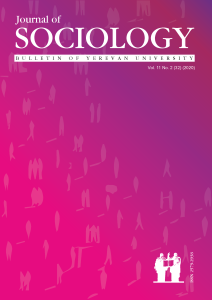Women in the Military Sphere: Some Issues of Social Adaptationilitary Sphere
DOI:
https://doi.org/10.46991/BYSU:F/2020.11.2.040Keywords:
women in military, social adaptation, female military staff, integration modelsAbstract
Since the 1970s, feminist movements and the recognition of gender equality as one of the basic human rights, as well as a number of other legal, socio-political changes in the armed forces have recorded significant structural changes that have provided the “weaker sex” with wider access to this area. The article deals with issues related to the dynamic processes of social integration of women in the army environment. Based on the analysis of a number of models of their involvement in the armed forces, the main factors influencing the stage-by-stage processes of such involvement in this specific area are presented.
References
Barb'eri, E. (1993). Rol' jenshchiny v obshchestve budushchego. Kur'er YUNESKO
Grady, C. (2018). The waves of feminism, and why people keep fighting over them, explained. Retrieved from https://www.vox.com/2018/3/20/16955588/feminism-waves-explained-first-second-third-fourth
Avetisyan, A.R. & Atanesyan, A.V. (2016). Kiny ev banaky: himnakhndirner, martahraverner ev hnaravorutyunner. Yerevan, 13-14
Verveer, M. (1979). Women and Gender Perspectives in the Military: An International Comparison. Edited by Egnell Robert and Alam Mayesha. Washington, DC: Georgetown University Press, 1-3
Duncanson, C. & Woodward, R.(2015). Regendering the military: Theorizing women's military participation. Security Dialogue, 4. Doi: https://doi.org/10.1177/0967010615614137
Winslow, D. (2010). Gender and Military Sociology, Swedish National Defence College, Department of Leadership and Management, 8. Retrieved from https://pdfs.semanticscholar.org/8e46/220715509f02bab3e93207473d5e653ed74b.pdf
Zeigler, S. L. & Gunderson, G. G. (2005). Women and the U.S. Military. Lanham, MD: University Press of America, 6
Goldring K., Should women serve in the combat unites, Retrieved from https://www.theper-spective.com/debates/living/women-serve-combat-units/
Segal, M. W. (1995). Women’s Military Roles Cross-Nationality: Past, Present and Future. Gender and Society, 9 no. 6, 757–775. Doi: https://doi.org/10.1177/089124395009006008
Iskra, D.M., Trainor, S.C., Leithauser, M., & Segal, M.W. (2002). Women's Participation in Armed Forces Cross-Nationally: Expanding Segal's Model. Current Sociology, 50, 771 - 797. Doi: https://doi.org/10.1177/0011392102050005009
Zavyalova, E.K. (2001). Psikhologicheskie mekhanizmy social'noi adaptacii. Vestnik Baltiiskoi pedagogicheskoi akademii. 40, St. Peterburg
Hollingshead, A. B. (1946). Adjustment to Military Life, American Journal of Sociology. Human Behavior in Military Society. Vol. 51, No. 5, 439-447. Doi: https://doi.org/10.1086/219855
Atanesyan, A.V (2012). Razmasociologiakan usumnasirutyunneri motecumnern u metodabanutyuny, Zinvorakan arajnordutyun, Yerevan, 24-31
Neronova, O.E. (2014). Specifika adaptacii voennoslujashchikh k slujbe v armii, Vestnik Voronejskogo gosudarstvennogo tekhnicheskogo universiteta T 10 No3-2, 58-59
Atanesyan A. (2014). Women in Armenian Armed Forces: self-perception and opportunities for the better recruitment and adaptation policies, Center for Gender and Leadership studies, 4-5. Retrieved from http://www.ysu.am/files/Arthur%20Atanesyan.pdf
Downloads
Published
Issue
Section
License
Copyright (c) 2020 Mariam Gevorgyan

This work is licensed under a Creative Commons Attribution-NonCommercial 4.0 International License.





